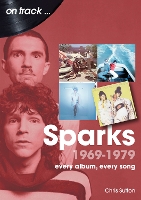


|
|
|
books
| book details |
Sparks 1969 to 1979 On Track: Every Album, Every Song
By (author) Chris Sutton

|
| on special |
normal price: R 602.95
Price: R 542.95
|
| book description |
This long-overdue book charts the career of Sparks from 1969 - 1979. Every album and every song is examined, including some which are still officially unreleased. Beginning with their early recordings as Halfnelson/ Sparks and when they were a band of five. After that band split, Ron and Russell Mael retained the name and spent much of the seventies working with a succession of sidemen and collaborators, although this was not always evident to some! They ended the seventies on a high note with the collaboration with Gorgio Moroder for No. 1 In Heaven. Many who worked on their records have shared their thoughts in the book. The list includes: Dean Detrick, Simon Draper, Harley Feinstein, Martin Gordon, Ian Hampton, Rupert Holmes, James Lowe, Sal Maida, James Mankey, John Mendelsohn, Adrian Munsey, Ralph Oswald, Peter Oxendale, Mike Piggott, Terry Rae, Thom Rotella, Suzi Ronson, Paul Rudolph, Richard Digby Smith, Karl Stoecker, David Swanson, Trevor White, Muff Winwood and Luke Zamperini. This book adds new information for fans and lively opinions on the records. It's a must-have for anyone who wants to know more about how Sparks developed in the decade which saw them create a lot of their best work.
| product details |

Normally shipped |
Publisher | Sonicbond Publishing
Published date | 25 Oct 2024
Language |
Format | Paperback / softback
Pages | 160
Dimensions | 210 x 148 x 0mm (L x W x H)
Weight | 0g
ISBN | 978-1-7895-2279-2
Readership Age |
BISAC | music / genres & styles / general
| other options |

Normally shipped |
Readership Age |
Normal Price | R 641.95
Price | R 577.95
| on special |
|
|
|
To view the items in your trolley please sign in.
| sign in |
|
|
|
| specials |
|
This first comprehensive biography of Cecil Rhodes in a generation illuminates Rhodes’s vision for the expansion of imperialism in southern Africa, connecting politics and industry to internal development, and examines how this fueled a lasting, white-dominated colonial society.
|
|
|
Let's stare the future down and, instead of fearing AI, become solutionists.
|
|
|
|